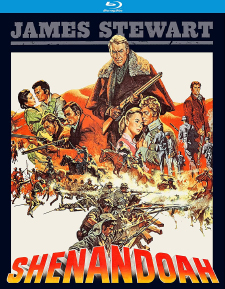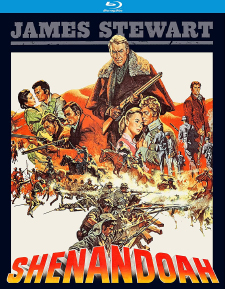Shenandoah (Blu-ray Review)

Director
Andrew V. McLaglenRelease Date(s)
1965 (July 27, 2021)Studio(s)
Universal Pictures (Kino Lorber Studio Classics)- Film/Program Grade: A
- Video Grade: A-
- Audio Grade: B
- Extras Grade: B+
Review
Shenandoah is a Civil War drama, a tale of family solidarity, and an allegory about the futility of war. James Stewart stars as widower Charlie Anderson, the tough-minded patriarch of a large Virginia family of adult offspring. Though they are Southerners, they work their large farm with no slave labor and resist the war, even as the last Confederate stand encroaches on their lives.
Charlie, his sons Jacob (Glenn Corbett), James (Patrick Wayne), Nathan (Charles Robinson), John (James McMullan), Henry (Tim McIntire), and Boy (Phillip Alford), daughter Jennie (Rosemary Forsyth), and daughter-in-law Ann (Katharine Ross) share a ritual at dinner each night of speaking their minds. All are somewhat intimidated by Charlie’s commanding presence and opinions, but he listens to their concerns, serving as family moderator. The main topic of late has been whether to join the Confederate forces. Not believing in slavery, Charlie has remained neutral. He declares that he’s never asked nor received anything from the State and doesn’t feel obliged to send his sons off to defend it. He needs them on the farm.
He fends off a Confederate officer demanding that Charlie’s sons join the fight and a group of men demanding to buy his horses for the Confederacy. The latter confrontation erupts into a brawl and the purchasing agents are run off the Anderson property. Things begin to change when Jennie marries neighbor Sam (Doug McClure), a Confederate officer called to duty on his wedding day. When 16-year-old Boy is taken prisoner by a group of Union troops who mistake him for a Confederate soldier, Charlie knows he can no longer isolate his family and they set out to find the Boy. As they search, they face the fruitlessness of war as well as personal tragedy.
Director Andrew V. McLaglen and writer James Lee Barrett have crafted a story centered on a single family with the Civil War as backdrop. The characters are richly drawn and the milieu effectively established. Although we never see the acres and acres of produce Charlie speaks about, the plot is engaging and the supporting cast quite good.
But this is James Stewart’s film, and presents one of his finest screen performances. Stewart’s delivery is quietly authoritative, slow, methodical, and even-tempered, except for one dramatic moment when his character’s anger gets the best of him.
With the constant cigar hanging out of his mouth, his homespun common-sense morality, his impatience with established religion, his devotion to family, and his stubbornness, Charlie is cantankerous but his beliefs are logical and thought out. He represents a wisdom that comes of experience, living through good and hard times. He gets involved in the war, if only marginally, only when one of his own is taken from him.
The film has a number of extremely well staged battle scenes. A bit of humor is injected when a Confederate officer, under a flag of truce, attempts to wrangle a lone cow while both Union and Confederate troops cheer him even as both sides stand ready for a skirmish. Stunt work is first-class and involves men falling from horses, cannon balls exploding amid soldiers, and fist fights.
Featuring 1080p resolution, the Blu-ray of Shenandoah from Kino Lorber Studio Classics is presented in the widescreen aspect ratio of 1.85:1. Visual quality overall is very good, though there are dirt specks and minor scratches in the battle scenes, which were shot for an earlier film and edited into the newer footage. The Technicolor cinematography doesn’t offer the richly saturated colors that you’d see in an MGM musical, instead using subtler hues more appropriate to the subject, tending toward browns, tans, and blacks. Flesh tones are pleasant, with women’s faces creamy smooth. The lush greens of the Anderson farm appear to stretch endlessly. Uniforms of the Union and Confederates show considerable wear and dirt, reflecting men who have seen battle. William A. Clothier’s photography is especially impressive in the dinner scene, when Charlie and family discuss the war. Softly lit, the scene shows the family around a table, their physical closeness reflecting their togetherness as a family. Matte paintings are used in a few long shots to enhance the scope of the Anderson farm. An elaborate scene features a train being burned at night, the flames lighting up the sky.
The soundtrack is English 2.0 Mono DTS-High Definition Master Audio. English SDH subtitles are an option. Dialogue is clear throughout. Though the film is set in Virginia, there is no attempt to have actors speak with a regional dialect. They sound like professionally trained actors rather than farmers. Composer Frank Skinner weaves traditional folk music into his score, which is effective in both the battle scenes and in tender, sentimental moments. Sound effects include cannons, rifle fire, explosions, men shouting, men pummeling one another, objects breaking as men are propelled into them, and the Boy repeatedly, and comically, being pushed into a water trough. A monologue delivered by Charlie to his deceased wife at her gravesite is spoken softly and lovingly as he stands in the shade of a large oak tree.
Bonus materials include an audio commentary and several theatrical trailers.
Audio Commentary – The commentary is shared by film historians Michael F. Blake, C. Courtney Joyner, and Constantine Nasr. A huge hit at the box office, Shenandoah was director Andrew V. McLaglen’s first film for Universal and was a well-suited role for James Stewart. The battle scene footage comes from the 1957 MGM film Raintree County. The three commentators believe the film is undervalued. The film had problems with the Production Code. Universal wanted it to be family friendly, but it doesn’t shy away from violence. John Ford’s influence is apparent in a number of scenes. The cast and crew are a mixture of older and newer generations, and the cast includes several veteran character actors. Both Rosemary Forsyth and Katharine Ross made their screen debuts in Shenandoah. The film is referred to as a “historical parable” in which the weight and burden of religion on the Anderson family is a theme. When he says grace before dinner, Charlie basically says that he and the family have achieved everything through their own hard work. Charlie sees no value in war, so he won’t sacrifice his sons. Universal was still holding onto its contract system. Doug McClure, under contract to Universal, had become popular on the TV western series The Virginian and was cast as Sam. Phillip Alford’s character is referred to as the Boy, with no name given. Charlie’s confrontations with neighbors, the preacher, a Confederate officer, and purchasing agents give us insight into his way of thinking. It was unusual to show dead animals. Bloodletting had become more prevalent as the Production Code was softening. Stewart was a major star at Universal. His post-World War II films had bombed but Harvey and Winchester 73 began his successful relationship with Universal. He was the first star to receive a percentage of his film’s box office gross. The story encompasses many themes. McLaglen was an optimistic person and not cynical. He believed the story points had to come across visually. He got his start as a director for TV in the 1950s, working on Gunsmoke, Have Gun, Will Travel, and Perry Mason, among others. In those days, directors were under contract to networks and were assigned shows. The film’s success is attributed to its script and a longing for the past. Moviegoers liked seeing family-centered Americana. Shenandoah was a hit theatrically and a huge sale to television for Universal. It was also in the Films Incorporated 16 mm rental catalogue for 25 years. Beautifully bookended, the film starts and finishes with a reconfirmation of the family. McLaglen said that of all the films he directed, Shenandoah was his favorite.
Theatrical Trailers – Ten trailers for films available on Blu-ray from Kino Lorber Studio Classics are included: Shenandoah, Made for Each Other, Broken Arrow, No Highway in the Sky, Bend of the River, Thunder Bay, Night Passage, The Rare Breed, The Way West, and The Devil’s Brigade.
Shenandoah is a well-acted, folksy, and occasionally sentimental Civil War drama. Released during the Vietnam War, the film’s anti-war sentiments resonated with audiences of the time. The film is still moving, as it personalizes war’s loss, both physically and spiritually. Confiscation of private property, conscription of sons, and the death of loved ones bring the war to the Anderson’s doorstep. The film illustrates that war is pervasive, even impacting the lives of those who try to stay out of it.
- Dennis Seuling

